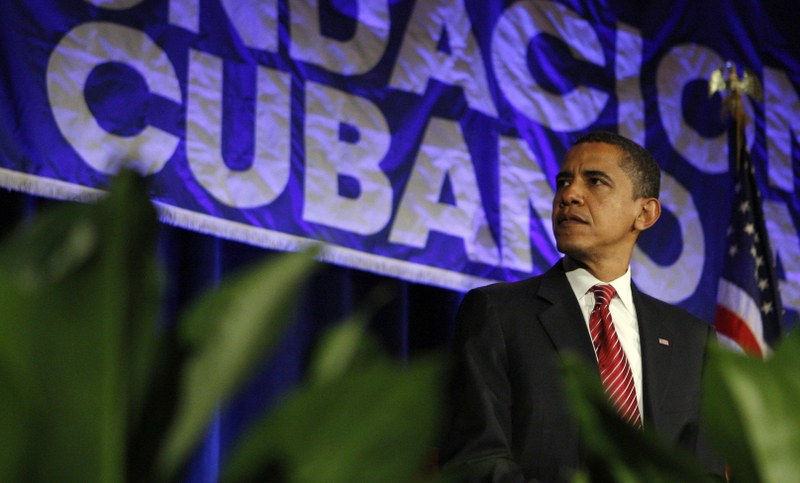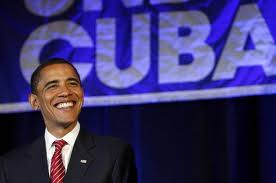
Obama: U.S. must update its Cuba policies
President Barack Obama said Friday in Miami that the United States must continue to update its policies toward Cuba. We have to be creative, he said during a fundraising event for the Democratic Party.

Obama added that his administration has begun to see changes in the island and acknowledged that the younger generations of U.S. and Cuban-American politicians are more open to find “new mechanisms” to spur changes in Cuba.
The objectives of U.S. policy remain the same, but the United States must find new tools to express them, he said.
Obama, who was born in 1961, recalled that he was born at about the same time that the Cuban Revolution occurred and pointed out that thinking that the same policy maintained since then could somehow be effective in the era of the Internet, Google and a changing world makes no sense.
The United States broke diplomatic relations with Cuba in 1961 and imposed a total economic blockade in 1962. According to Cuban authorities, that policy has caused losses to Cuba amounting to $1.157 trillion dollars.
Last Oct. 29, for the 20th consecutive year, 188 countries at the General Assembly of the United Nations ratified their condemnation of that policy of blockade.
On Friday 8, Obama spoke in Miami at a fundraising event for the Democratic Party, organized by Jorge Mas Santos. His host is the son of Jorge Mas Canosa, who, until his death in 1997, led sectors of the ultraright in Miami and sponsored confessed terrorists like Luis Posada Carriles and Orlando Bosch.
Mas Santos, a former supporter of the Republican Party who now heads the Cuban American National Foundation he inherited from his father, has supported Obama since the 2008 campaign. In the 2012 race, Obama was re-elected with 53 percent of the Cuban vote, 14 points more than he obtained in 2008.
On Friday, the president met with Cuban dissidents Bertha Soler and Guillermo Fariñas at the home of Mas Santos. Both activists reportedly asked Obama that the opposition be given a presence at any future negotiation between Cuba and the United States.
In 2009, during the Fifth Summit of the Americas in Trinidad and Tobago, Obama said that “the United States seeks a new beginning with Cuba.” Addressing the region’s leaders, he said: “Let me be clear. I am not interested in talking for the sake of talking. But I do believe we can move U.S.-Cuban relations in a new direction.”
“I’ve already changed a Cuba policy that I believe has failed to advance liberty or opportunity for the Cuban people,” the president said at the time, adding that “over the past two years I’ve indicated, and I repeat today, that I’m prepared to have my administration engage with the Cuban government on a wide range of issues — from human rights, free speech, and democratic reform to drugs, migration, and economic issues.”
Analysts believe that in the second half of his second term, Obama would have more opportunities to go from speech to deeds. For his part, Raúl Castro has repeatedly mentioned Cuba’s willingness to hold an unconditional dialogue.
During the Sixth Congress of the Communist Party of Cuba in April 2011, Castro stated Cuba’s willingness to dialogue and added that his country accepted “the challenge to maintain normal relations with the United States, in which we can coexist in a civilized manner despite our differences, on the basis of mutual respect and no interference in domestic affairs.”
In December 2012, again addressing the Cuban Parliament, the Cuban president reiterated “to the North American authorities Cuba’s willingness to a respectful dialogue based on sovereign equality, on all bilateral problems, at the same time that our offers of cooperation on issues of common interest remain on the table, without preconditions or previous gestures.”
In recent years, the bilateral agenda has included topics of common interest such as telecommunications, postal service and immigration. Both countries have taken steps to facilitate the movement of Cubans and Cuban-Americans between the two countries and the improvement of people-to-people contacts.
At the U.N. recently, Cuba’s foreign minister, after stating that Cuba does not constitute a threat to U.S. security, wondered why Americans cannot have access to Cuban pharmaceutical products of top quality. He was referring to Heberprot, a medication for the treatment of diabetic-foot ulcers, which has been the subject of recent debates among politicians in South Florida.
“Why do [U.S.] businessmen miss opportunities? Why can’t they open new businesses that would create employment in times of crisis? Why can’t American companies gain access to the new Special Development Zone at Mariel?” asked Bruno Rodríguez Parrilla.
While Cuba continues to advance in its reforms, new visions emerge of the future relations between the two countries. Many of the transformations in the island would have a positive influence on not only the Cuban-American community but also the population that surrounds the Cuban enclave in Miami.
Progreso Semanal/ Weekly authorizes the total or partial reproduction of the articles by our journalists, so long as source and author are identified.

